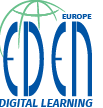
- This event has passed.
Naples
February 26, 2011 @ 00:00
Snapshot of the Scene
The rush is on: the rapid evolution and widespread penetration of new media and technologies, emerging new tools and solutions constantly change and challenge the ways and means of accessing and sharing knowledge.
The educational landscape is now also alive with catchwords about the hot technology tools, the Web 2.0, aggregators, the Social Web, collaborative content creation, writing and bookmarking, etc. The road for the nomadic learners on the web is paved by online knowledge communities – social tagging folksonomies – inquiry learning – ubiquity – digital learning games, etc.
A growing pressure persists to improve ICT uptake in support of the European strategy to become a powerful knowledge economy, to help the development for growth and jobs. The importance of workplace learning, non-formal and informal learning is increasing, influencing more and more the culture of learning.
Quality – recognition assessment accreditation, together with competences, remain core issues in the light of the coming European Qualification Framework and the EU Lifelong Learning Programme starting in 2007.
Trust or Not?
The critical voices are however also present. E-learning is not a shortcut to happiness – Dont trust e-learning as it is now… The usability of e-learning is questioned, ICTs are criticised for not meeting the requirements of the future, rather serving the learning needs of the past.
It is apparent that it will take quite more time to learn how to use the e-learning technologies properly, to change learning paradigms to benefit fully from the possibilities offered by ICTs. But all in all: is e-learning really transformative? Whilst it is often stated that new technology solutions require new pedagogical approaches and organisational structures, no radical de-institutionalisation seems to occur, as it was earlier predicted. Emerging technologies are far from being implemented and supported in the systems. A gap exists between concepts and visions on e-learning and the real impact of the new technologies on mainstream education and the training process. Looking critically at the vision for e-learning seems to be a responsible response once again.
Wanted: Realistic Futurists and Progressive Practitioners
E-learning is evolving, like is the world around us. The relationship between learning, working and the rest of life is also subject of profound changes. The quest for a long term e-learning model and the concern of e-learning as distinct field being dissolved by the limitless penetration of ICT in everyday life are present in parallel. Successes are vulnerable because of the never-ending paradigm shifts. The poor visibility of valuable achievements hinders the mainstreaming of credible solutions.
Reaching the point of critical mass with convincing examples and practices should help to consolidate the professional knowledge. There is an ever stronger need for the validation of the visions, the conceptualisation of the results available, the credible demonstrations of the possible. A kind of strategic mechanism for accelerated progress could support the timely consolidation.
The need for a transversal, holistic approach is strengthening, in the meantime, a kind of cycle in the innovation process seems to have come to an end. We can expect a new wave of ambitious initiatives to come. This may be realised quite differently in the corporate environments, in training, in higher education, in informal learning, etc.
The traditional educational systems and settings are changing slowly. Together with visionaries and the socio-technical forerunners, important role remains with the progressive practitioners, who investigate, develop, experiment with new solutions and deliver proofs of good practice in e-learning.
Whilst many researchers anticipate quick the transformative impact of the social web and the consequent radical conversion in the world of learning, quite a few successful practices seem to show consolidation along the well known open and distance learning methods and principles.
Several professionals argue that successful and acknowledged e-learning practice in most cases has a lot to do with well designed and implemented distance learning in contemporary technology environments. In the years to come, hard work will be needed to develop, test and validate the methodologies, in order to identify their role accurately.
Digital Territories, Continuities and Divides
The present transformations are accompanied by the emergence of new digital territories – as well as the web: geopolitical, social spaces, academic and subject territories, different fields of e-learning and training. They may generate or facilitate both continuities, or on the contrary, divides of several kinds, between what has traditionally been well demarcated and what should not be divided.
Social exclusion is becoming nowadays a major concern. A developing praxis leads from the ideal conception of ‘inclusiveness’ to the reality of embedded inclusive learning. New economic and business models may bridge the divide between the creative and social values, and commercial interests. The fast increasing interest in the questions related to open content and open educational resources is a good example of emerging significant trends.
